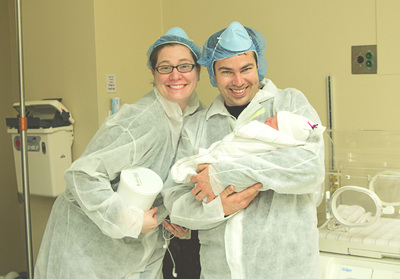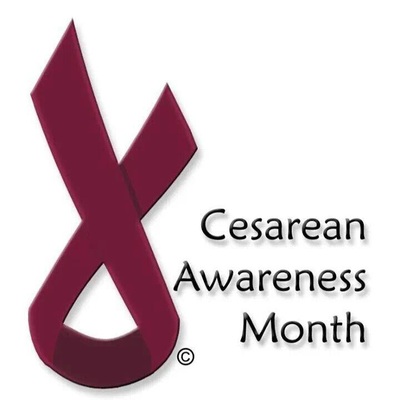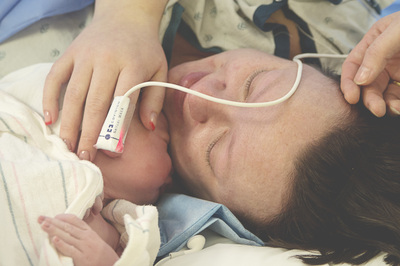|
Originally published in April 2014 My journey into birth began 14 years ago after the birth of my first nephew, Micah. I wouldn’t fully embrace birth as my calling until many years later, after the birth of my own two girls and the 'birth' of the passion inside me to bring services of meaning to pregnant women and their families. I will never forget that moment. After an induction that lasted more than 24 hours, and “arrest of descent” of the baby during pushing, my sister was told that she would need a cesarean section. I watched as her face turned from determination, to disappointment, to resignation, and to sorrow. As my mom and I left the room while they began the surgical prep, I said to Mom, “That’s not what we wanted.” With tears trickling down her cheeks, she shook her head, “No.” The grief for what Sarah so badly wanted – a vaginal birth with minimal interventions – was palpable. A few years later, as I was pregnant with my first child and wanting to learn as much as I could about having a healthy birth, Sarah invited me to an ICAN (International Cesarean Awareness Network) meeting. At that time, the group was small and had just begun reforming here in the Twin Cities. I happened to attend on a night when a wise midwife named Gail Tully was on hand to provide information and practice in ‘optimal fetal positioning’ for birth. I didn’t know anything about birth balls or Rebozos, or the side-lying release. I just knew that it felt so good (and kind of funny!) as I was used as the ‘pregnant model’ for Rebozo belly sifting. Two babies later, both of which included my sister’s attendance and support, I began the true path to birth work as a Lamaze Certified Childbirth Educator, doula, and HypnoBirthing Certified Educator. Again, my journey was largely inspired not only by Sarah’s first birth, but also by her successful VBAC (vaginal birth after cesarean) her second time around. To offer full disclosure, I somewhat dreaded as a doula the first time I would need to step into the surgical suite and witness a mama experience a cesarean birth. In some small way, I was traumatized by my sister’s experience. Now with many under my belt, I can say that my perspective has changed. Yes, it is still difficult. But, with my doula hat on, I enter the experience with an open heart and an open mind, with nothing but how I can best support that mama in that moment as my focus. It is at that time that we turn our trust over to the trained surgeon whose job now is to safely bring the baby forth from the mother's womb. I offer a grounding hand on the forehead, an explanation of what to expect and what is happening, sounds and smells that calm the mother, words of reassurance to the partner, and pictures if mama desires. I have seen mothers who view their surgical births in many different ways: From full-on acceptance; to complete devastation (offering my doula hands to wipe away tears); to somewhere in the middle (perhaps with resignation and a resolve to process the experience later). I have seen cesareans that are completely medically necessary, and those that fall in a grey area. Look, the cesarean rate in this country (31.9%) is too high. There’s no way around that. We can do better. For women, for babies, and for their families. It may feel daunting to tackle this subject on a grander scale and I know many of us birth workers often feel at a loss. But here is what we can do:
Below is a news story regarding the U of M's research into cesarean rates from 2014, for which Erin was interviewed:
0 Comments
Leave a Reply. |
AuthorErin Stertz-Follett, Owner Categories
All
Archives
January 2024
|
|
All photography on this site used with permission. Special thanks to Raven Ivory Photography + Films, Megan Crown and Danica Donnelly and Gather Birth.
Edina, Minnesota [email protected] ©Flutterby Birth Services, LLC 2012-2024 |
Contact Registration Hypnobirthing Doula
Minneapolis Doula | St. Paul Doula | Minneapolis Childbirth Education | Minneapolis Hypnobirthing | Edina Hypnobirthing | Apple Valley Hypnobirthing | Lakeville Hypnobirthing | Eagan Hypnobirthing | Shakopee Hypnobirthing | Burnsville Hypnobirthing | Rochester Hypnobirthing | Inver Grove Heights Hypnobirthing | Chanhassen Hypnobirthing | Richfield Hypnobirthing | Bloomington Hypnobirthing | St. Paul Hypnobirthing | Twin Cities Doula | Twin Cities Hypnobirthing | Richfield Childbirth Class | Edina Childbirth Class | Minneapolis Childbirth Class | Birth Class Twin Cities | Minneapolis Birth Ed | Minneapolis VBAC | Virtual Hypnobirthing |




 RSS Feed
RSS Feed